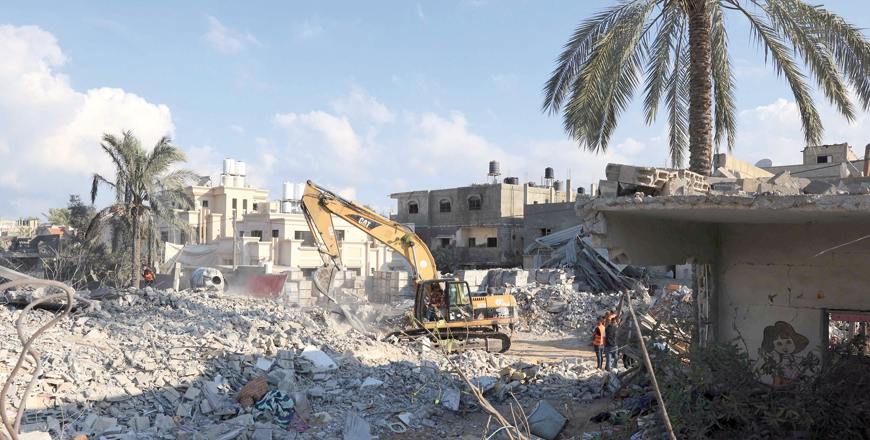By Sara Faqir – Oct 18,2023

AMMAN — The devastating impact of the Gaza war on sustainability and the environment is an urgent concern, disrupting ecological balance and consequently taking a toll on both the environment and communities, according to conservationists.
The environmental toll of war manifests in various ways, including widespread deforestation, contamination of water sources, destruction of habitats and release of toxic chemicals.
President of the Jordan Environment Union Omar Shoshan told The Jordan Times that there is a direct impact of wars on the destruction of ecosystems, especially when using internationally prohibited chemical weapons, such as phosphorus, as it was used in the war on Gaza.
These lethal weapons cause an environmental catastrophe at the level of the basic elements of the environment, polluting the soil, groundwater, and surface water and contaminating the air, making it highly toxic and detrimental to human health, he said.
“Wars have a direct impact on climate change by increasing carbon emissions and destroying infrastructure. The Gaza Strip is a stark example in the face of a complex crisis from a humanitarian, environmental, health and climate perspective due to the repeated wars it has experienced in recent years,” he added.
The role of youth and activists in advocating for their right to live in a stable and healthy environment, as well as working to embed environmental rights and climate justice in their lives, is of utmost importance, Shoshan said.
He stressed that Arab youth should exert pressure on their governments to adopt a global covenant for the protection of natural resources during times of war. Furthermore, they should raise issues in international courts to seek compensation for the losses and damages resulting from environmental war crimes.
Sakher Al Nsour, former head of the Jordanian Geologists Syndicate, told The Jordan Times that the Israeli aggression on Palestinians has not been limited to targeting human beings alone; it has also extended to the environment by destroying the infrastructure of the environmental sector.
This has been achieved through the use of hazardous and toxic materials in Palestine, leading to the destruction of sewage networks and reservoirs, as well as the continuous depletion of natural resources, Nsour said.
He emphasised the adverse effects of phosphorus, which is used in bombardments over the Gaza Strip, on the environment. These effects include soil losing its ability to support crop cultivation, water pollution, and the accumulation of the substance in aquatic ecosystems.
To better understand the impacts of war, Ghazi Qussous, a Geographic Information System (GIS) expert, told The Jordan Times that creating maps that identify specific conflict zones and areas impacted by war can be utilised in understanding the geographical extent of the environmental impact.
“From a GIS — a computer system that processes and visually represents geographical data — perspective, addressing the various requirements of policymakers, researchers, and organisations necessitates the establishment of a consistently updated and well-organised GIS database.
This comprehensive database equips users with the capability to leverage a wide array of GIS tools for analysis. The upkeep of this GIS database requires a dedicated team of experts to maintain its functionality and readiness to respond effectively to any situation, one of which is war,” he added.
Salem Khraisat, a civil engineer, highlighted the hurdles associated with water infrastructure in wartime and its aftermath. He pointed out that significant challenges lie ahead for water distribution and network maintenance, especially when dealing with manual networks that lack motorised valves. This situation could demand extensive restructuring and rehabilitation projects.
Moreover, the process of laying pipes is anticipated to experience prolonged schedules due to the necessity of clearing war-ravaged areas prior to commencing construction. This scenario underscores the imperative requirement for planning and resource allocation in these contexts, Khraisat said.
